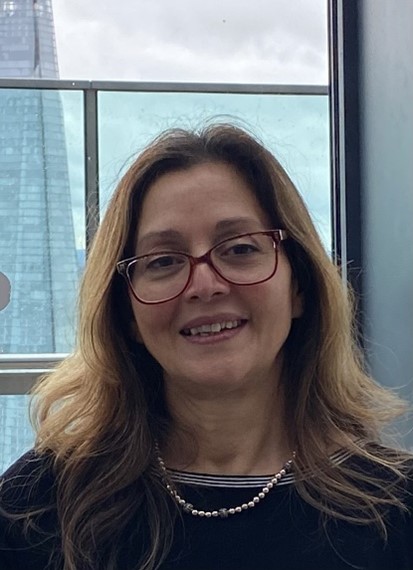This month our theme is 'Loving One Another' and part of that is celebrating our differences. Neil Masih, our Intercultural Mission Enabler, has interviewed four people from our diocese from different backgrounds about their experience of being part of the Church of England. The first interview is with Mary Morris from All Saints, Bedworth.
What are the joys of worshipping in the Church of England?
Coming from an Asian Muslim background, here are some of the joys I have experienced as a worshipper in the Church of England.
a) I love that there is a weekly focus on the Eucharist as a divine act, celebrating the presence of Christ when we share communion. This may not happen as regularly across all denominations.
b) The Church is not too fixed on one style – it allows for thoughts from different theologians throughout history, like Calvin and Luther, without adhering singularly to just one. There is a sense of ‘keeping the mystery,’ holding ideas in tension.
c) Idea of sacred space. Having worshipped in a Pentecostal stream for 27 years, I was blown away in my current church by the sense of ‘sacred space,’ a space that has seen and encountered worship throughout the ages, from ancient times past. This sense of sacredness allows me to take stock of who I am, in the awe and fear of the Lord, but also, that I am one ‘grain of sand’ in the sacred timeline of worshippers who have left behind a legacy and well of faith in this space.
d) During communal worship everyone participates, or at least the Liturgy enables and encourages participation from everyone. Even those new to church can follow. The Church has managed to hold on to an ancient form and pattern of worship despite an everchanging society. Not only has it remained a constant in England, but the pattern and form is shared all across the world in the order of Sunday services and in the Daily Offices. The Liturgy encapsulates numerous elements: creating a pattern for communal repentance, declaring the Creed as a profession of ‘our’ collective faith. It provides a scaffolding for declaring these in unity. This has spiritual significance; there is power in a unified voice.
e) I love how the Church is increasingly open to Charismatic worship, recognising and even hungering after the gifts of the Holy Spirit – as we are urged to do so in 1 Corinthians 14:1. For me, personally, the Charismatic not only enables a time of sombreness and soberness, a time of reverence and awe, but also an incredible encounter with a God of freedom and joy.
Anglican worship done well offers such an incredible wealth to a society that is seeking healing from guilt, shame, mental breakdown, as well as breakdown of family and relationships. It really is a powerful answer for a healthy mind, body, soul and spirit.
What are the challenges/barriers and how do we overcome those?
This openness to the Holy Spirit is not evident everywhere. There is still much suspicion and fear of the gifts of the Holy Spirit. Raising new leaders who are given opportunities to experience and encounter different forms and styles of worship, including charismatic worship would be one way of overcoming this.
The Church of England is really a global church, not just belonging to England. While it is difficult to navigate unity in England alone, the sense of unity must also extend to the global church. They have much to offer and are not second rate to England.
Looking forward what is important to hold onto in your faith and what do you wish to cultivate?
As we wrestle with the many ideologies and pervasive ways of thinking that vie for our attention and for a place of authority in our hearts, it is an encouragement to remember that our faith, the scriptures that we hold, and the very tradition that we could so easily take for granted, have all themselves been wrestled with and contested throughout history.
Isaiah 51 reminds me:
Listen to me, you who pursue righteousness
and who seek the Lord:
Look to the rock from which you were cut
and to the quarry from which you were hewn;
2 look to Abraham, your father,
and to Sarah, who gave you birth.
When I called him he was only one man,
and I blessed him and made him many.
3 The Lord will surely comfort Zion
and will look with compassion on all her ruins;
he will make her deserts like Eden,
her wastelands like the garden of the Lord.
Joy and gladness will be found in her,
thanksgiving and the sound of singing.
In order to look forward, it helps me to first look back. For example, the life of Irenaeus exemplifies a life on mission. He was an evangelist to the very core. Leaving his homeland, he was prepared to live a sacrificial life for the purpose of the ‘Barbarians,’ learning their language in order to share the gospel more clearly. Yet, he remained unblended and without mixture in both his identity and faith - being in the world and yet not of it. Likewise, we too can enter into the fullness of our identity in Christ, having the eyes of our hearts opened to recognise the same need in others. Irenaeus did not live in a time when sharing the gospel message was a popular thing to do. In fact, it was a time of heavy persecution of Christians, and he himself may well have been martyred. Today, and going forward, we need to recognise our identity like never before, as the voices of the world have never spoken louder.
My prayer today is that we, the Church, will step fully into our identities, into the revelation of who we are as children of God. As Irenaeus says, “The glory of God is the human person fully alive.”
